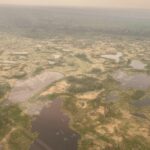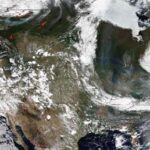What is Climate?
By: Phil Arkin
A truly startling (to me) number of people are described as, or call themselves, “climate scientists” these days – Wikipedia has a list of them, which includes no one that I would argue with but omits a very large number of those who clearly are practicing climate scientists (no one at ESSIC is on it, for example, even though just about everything we do could be so called). While programs in Climate Science have begun to appear, this is not a field like physics, in which only those with a degree in physics (or a recognized subfield) are regarded as qualified (as scientists) to make authoritative statements on, for example, the origin of the universe or the lifetime of the proton. Since climate is a popular topic these days, with a significant call for authoritative statements, significant effort has been made to figure who can credibly call themselves a climate scientists – a good example is provided by Barry Brook in his blog Brave New Climate.
I certainly consider myself a climate scientist, although my degrees are in mathematics and meteorology. However, I don’t think that there’s a real need for any sort of certification process – if the science in which one is engaged is climate science, then one is a climate scientist. This does raise the question that I mentioned in a previous post – is there a good general definition of the word “climate”?
Definitions exist, of course: from the Free Dictionary we have “The meteorological conditions, including temperature, precipitation, and wind, that characteristically prevail in a particular region”, and other dictionary-type resources give something similar. This, though, is precisely the long-standing definition of climate as the ensemble of weather that people my age grew up with, and really doesn’t adequately describe the science in which we are presently engaged. Meteorological textbooks almost always provide a definition, but the ones I’ve found are about the same as the dictionary ones (which probably just means that all the textbooks in my bookcase are pretty old). The newer Glossary of Meteorology uses “The slowly varying aspects of the atmosphere-hydrosphere-land surface system.” which is a bit more inclusive but still incomplete – it uses another 100 words to clarify and more than 5 pages of other terms beginning with “climate”, “climatic” and so on.
Given that climate science involves much of meteorology, oceanography, earth science, geology, physical geography, and probably lots of other topics, a simple definition seems out of reach – but maybe it’s not needed at all. It is probably comparably difficult to define “economics” or “physics”, but that doesn’t seem to cause problems.
Okay – a climate scientist is a scientist (“engaged in science”, defined by Wikipedia as “a systematic enterprise that builds and organizes knowledge in the form of testable explanations and predictions about the universe”) whose “universe” is the climate (see above). This is all clear enough to make me content. Interestingly, a lot of current climate research is focused on providing “actionable information” to parties who must act. This seems to be blending into politics (“the process by which groups of people make collective decisions”) and may be one reason why so many climate scientists end up arguing with non-scientists about global warming and what to do about it – from the non-scientist point of view this is politics, while the climate scientists see it as science.






